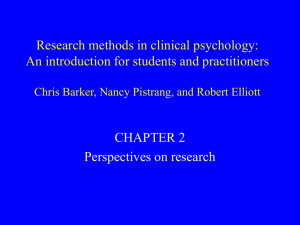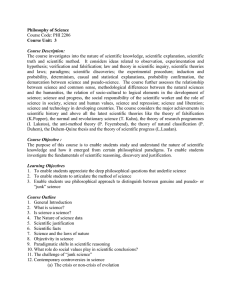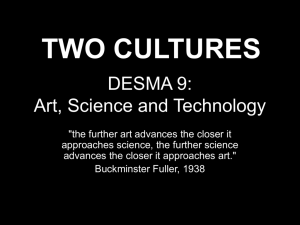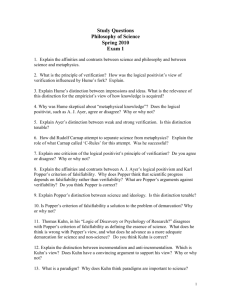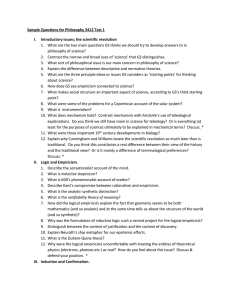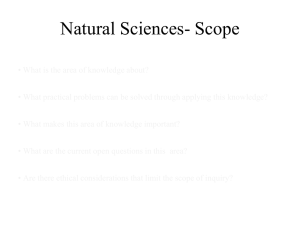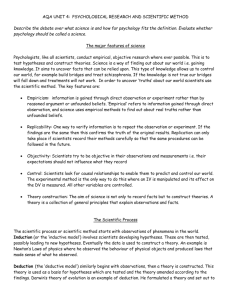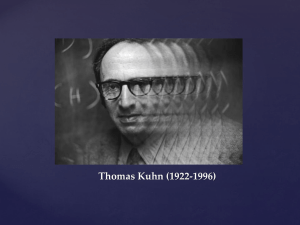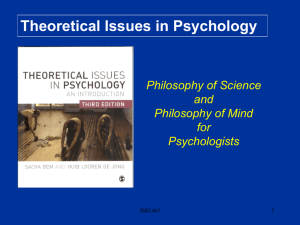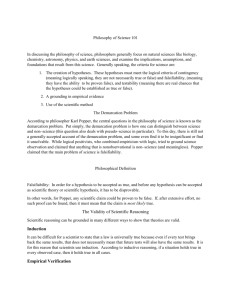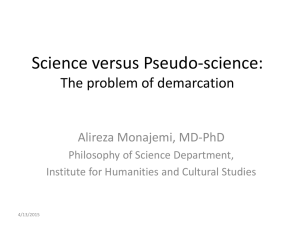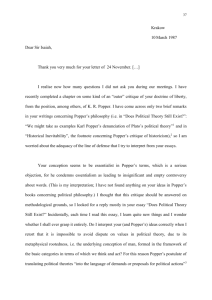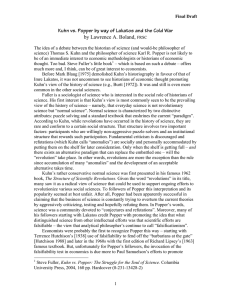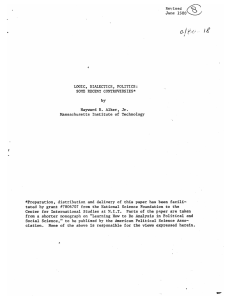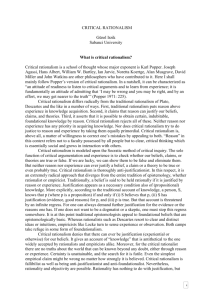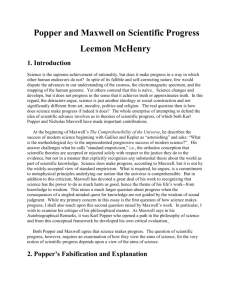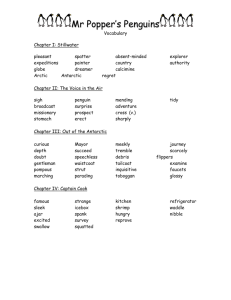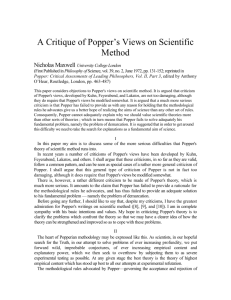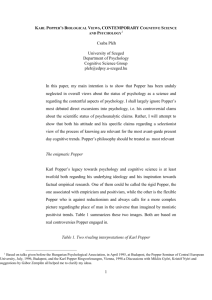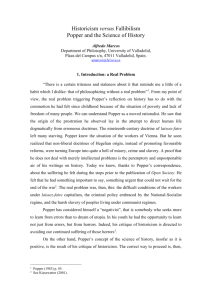handout
advertisement
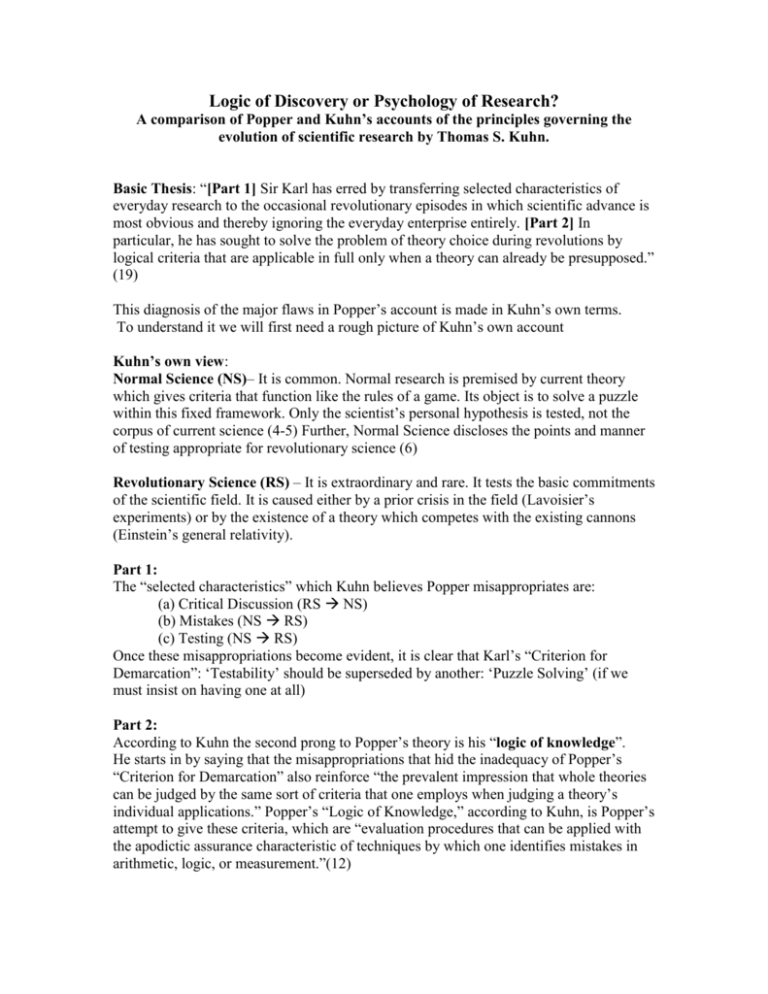
Logic of Discovery or Psychology of Research? A comparison of Popper and Kuhn’s accounts of the principles governing the evolution of scientific research by Thomas S. Kuhn. Basic Thesis: “[Part 1] Sir Karl has erred by transferring selected characteristics of everyday research to the occasional revolutionary episodes in which scientific advance is most obvious and thereby ignoring the everyday enterprise entirely. [Part 2] In particular, he has sought to solve the problem of theory choice during revolutions by logical criteria that are applicable in full only when a theory can already be presupposed.” (19) This diagnosis of the major flaws in Popper’s account is made in Kuhn’s own terms. To understand it we will first need a rough picture of Kuhn’s own account Kuhn’s own view: Normal Science (NS)– It is common. Normal research is premised by current theory which gives criteria that function like the rules of a game. Its object is to solve a puzzle within this fixed framework. Only the scientist’s personal hypothesis is tested, not the corpus of current science (4-5) Further, Normal Science discloses the points and manner of testing appropriate for revolutionary science (6) Revolutionary Science (RS) – It is extraordinary and rare. It tests the basic commitments of the scientific field. It is caused either by a prior crisis in the field (Lavoisier’s experiments) or by the existence of a theory which competes with the existing cannons (Einstein’s general relativity). Part 1: The “selected characteristics” which Kuhn believes Popper misappropriates are: (a) Critical Discussion (RS NS) (b) Mistakes (NS RS) (c) Testing (NS RS) Once these misappropriations become evident, it is clear that Karl’s “Criterion for Demarcation”: ‘Testability’ should be superseded by another: ‘Puzzle Solving’ (if we must insist on having one at all) Part 2: According to Kuhn the second prong to Popper’s theory is his “logic of knowledge”. He starts in by saying that the misappropriations that hid the inadequacy of Popper’s “Criterion for Demarcation” also reinforce “the prevalent impression that whole theories can be judged by the same sort of criteria that one employs when judging a theory’s individual applications.” Popper’s “Logic of Knowledge,” according to Kuhn, is Popper’s attempt to give these criteria, which are “evaluation procedures that can be applied with the apodictic assurance characteristic of techniques by which one identifies mistakes in arithmetic, logic, or measurement.”(12) Kuhn claims that if Popper were only interested in finding a criterion of demarcation then perhaps he could satisfy his requirement of logical certainty by devising a criterion which states: “a theory is scientific if and only if observation statements – particularly the negations of singular existential statements – can be logically deduced from it, perhaps in conjunction with stated background knowledge.”(14) The problem is that Popper’s demarcation criterion of ‘falsifiability’ is not meant to describe sentential relations but function within the context of “actual observations and experiments” and he is entirely silent about how it can do so. (15) Although he uses the rhetoric of disproof in describing falsification, “[Popper] writes: ‘in point of fact, no conclusive disproof of a theory can ever be produced.’”(14) Kuhn next introduces his ‘all swans are white’ example to show that “one can have sound knowledge in forms to which logic can scarcely be applied.” (16): (A) One way he shows his point is by giving an example where someone who has seen 10 white swans must describe what one looks like to a person who has never seen a swan. He argues that although one can’t be logically certain one isn’t making a mistake, it would take superhuman caution to avoid making the generalization. Section IV: Scientific Values Descriptive Question: How does science progress? Over time scientific theories become more articulated. In the process they match nature at an increasing number of points. A number of fields and sub-fields grow & the boundaries are extended. Explanatory Question: How does theory choice occur? The explanation of scientific progress “must, in the final analysis be psychological or sociological. It must, that is, be a description of a value system, an ideology, together with an analysis of the intuitions through which that system is transmitted and enforced. Possible Scientific Values: Puzzle solving; Simplicity; precision; congruence with theories in other disciplines; and conservativism. Final appeal to Popper and friends, differentiating Scientific values from individual psychological idiosyncrasies. Potential Problem for or Obscurity in Kuhn: “All theories can be modified by a variety of ad hoc adjustments without ceasing to be, in their main lines the same theories. It is important, furthermore, that this should be so, for it is often by challenging observations or adjusting theories that scientific knowledge grows. Challenges and adjustments are a standard part of normal research.”(13)
